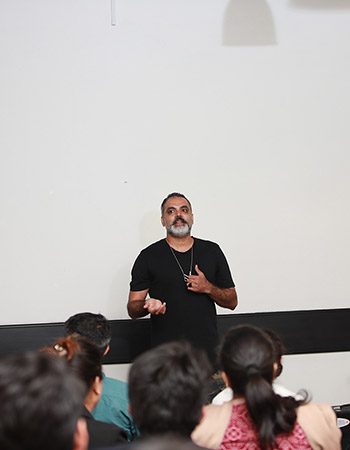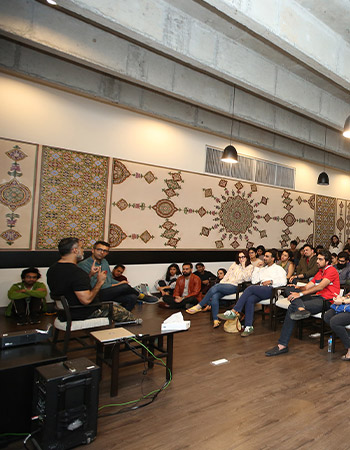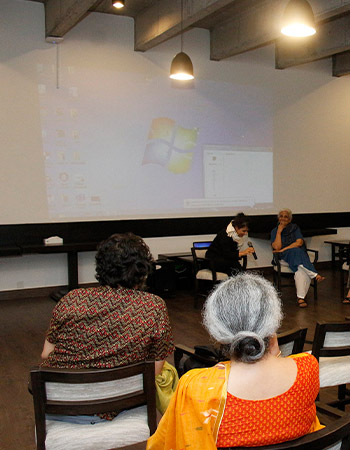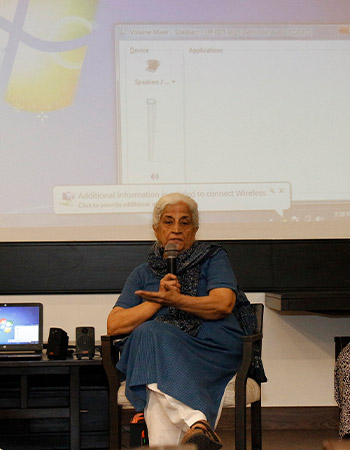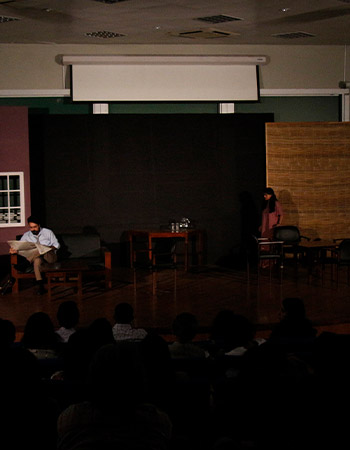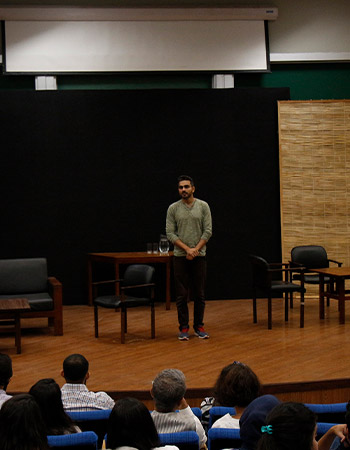Screening & Plays
SWGI screened the documentary, Tales of the Night Fairies on February 18, 2016. This was followed by a discussion with the director, Shohini Ghosh
About the Film
Karachi’s feminists organise a woman’s march, coming up against Pakistan’s radical religious right, and negotiating a deeply surveilled, paranoia-inducing, and often physically violent space in the hopes of a revolution. A philosophical work, This Stained Dawn is not just about the march, but about the act of political organising itself.
About the Director
Anam Abbas is a Pakistan based Pakistani/Canadian filmmaker. She runs Other Memory Media. As a producer and DOP her first feature "Showgirls of Pakistan", winner of the Best Pitch Award at the 2016 Hotdocs Forum, premiered in competition at IDFA 2020 and was released globally by VICE in 2021 and has over 2 million views. Anam's first feature documentary as a director, "This Stained Dawn", supported by the Canada Arts Council in 2020. Anam is an alumni of Locarno Film Festival's Open Doors Hub 2017, 2018 Berlinale Talents, 2019 Film Independant Global Media Makers, 2020 Berlinale Talents Project Market Fellow and 2020 Cannes Producer's Network. She is a 2020 Telefilm Canada Talents to Watch Grant awardee for Zarrar Kahn directed art house horror "In Flames", scheduled to premiere in 2023. The film is being represented by XYZ films for world sales. Anam is also one of the founding members of the Documentary Association of Pakistan (DAP).
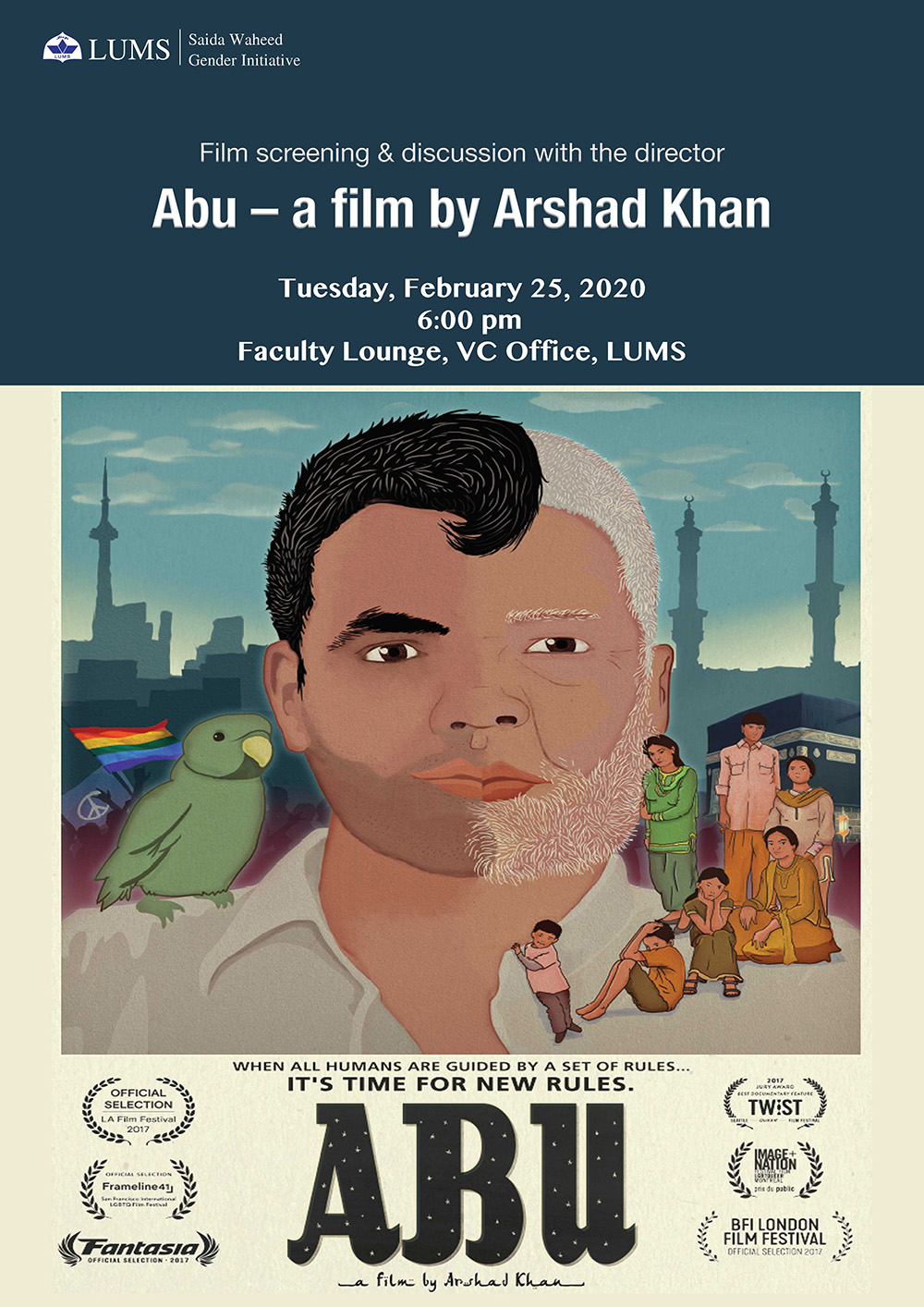
‘Abu’ – A film by Arshad Khan
Arshad Khan is a Montreal-based filmmaker and film festival programmer. Khan’s internationally acclaimed, award-winning autobiographical documentary Abu (2017) has played at film festivals around the world and won the INSPIRIT Foundation grant for 2018/19. Abu documents his rocky relationship with his father after Khan came out as a gay man. It also chronicles the wider story of young gay people fighting homophobia and invisibility within South Asian and Muslim cultures.
The film screening, which was held on February 25, 2020, drew a wide and diverse audience from across the city and was followed by a lively discussion with Arshad Khan about his inspiration, the process of making the film, and his experiences screening it around the world. Members of the audience shared their own emotional responses to the film and personal stories, and there was a wider discussion about marginalised sexualities in South Asian cultures including in Pakistan and in the diaspora.
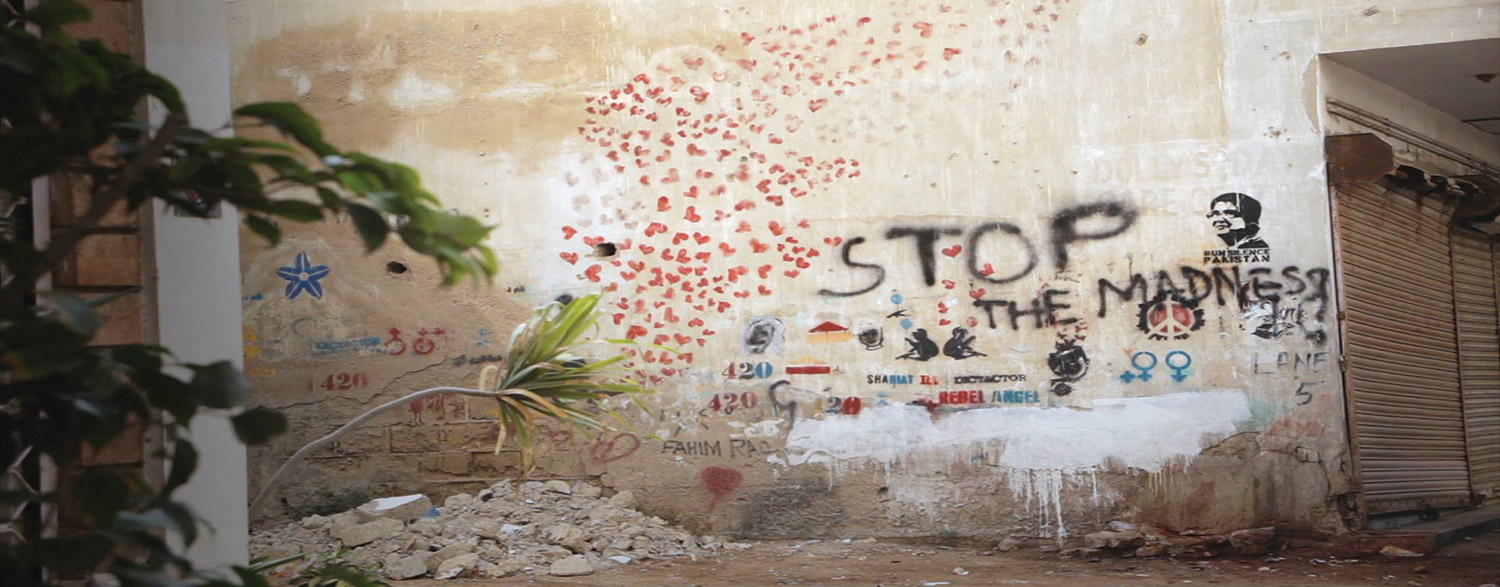
‘After Sabeen’ – a film by Schokofeh Kamiz
SWGI screened the documentary, After Sabeen, followed by a discussion with the director, Schokofeh Kamiz, and Sabeen's mother, Mahenaz Mahmud. In the wake of Sabeen Mahmud’s murder, the director followed her mother and friends to record not only their memories and grief but their ongoing impetus to continue Sabeen’s work.
Schokofeh, an Iranian filmmaker, used to be a video journalist, and After Sabeen is her first documentary. On the occasion of Sabeen’s murder, Schokofeh recalls sitting with one her friends who knew Sabeen. She observed how shattered he was and closely listened to what he had to say about Sabeen and her work. What inspired Schokofeh the most is how Sabeen not only opened up a space for having difficult conversations on a broad range of issues but also how she, in her everyday life touched the lives of so many. The documentary focuses on documenting how Sabeen is remembered rather than focusing on bringing forth shots featuring Sabeen. Schokofeh shares how this was a deliberate choice as she wanted to bring across the impact Sabeen had on people and the legacy she leaves behind.
Mahenaz shares her thoughts as Sabeen’s mother and someone who believes in the principles for which, her daughter worked tirelessly and bravely. She talked about how as her mother she never wanted to pass on the anxiety and fear she was made to internalise as a young woman. She wanted Sabeen to feel free and to do the things she wanted to do. She shared that she would raise her the same way and give her the same freedom of chasing her ideals and opening up space for others even if the consequence were to be the same.
When asked about how people from varying progressive political affiliations lay claim to Sabeen, Mahenaz responded, “It is difficult to put Sabeen in a box. I don’t refute people laying claim to her and sharing what they thought of her because I realise that she meant different things to different people and I am most grateful for that”.
The documentary was met with a lot of tears, joy, and praise. The sorrow of the audience was soon turned into celebration with audience members sharing their feelings and stories about Sabeen.

Lights Out
Directed by Fawad Khan
SWGI hosted the play, Lights Out directed by Fawad Khan this semester as well. Fawad Khan graduated from NAPA with a major in direction for stage 2008. Since then he has been consistently doing theatre, and being passionate about all aspects of theatre, he has not only been directing but acting and writing as well. The performers in the play were: Syed Meesam Nazar Naqvi, Kulsoom Aftab Ahmed, Muhammad Farhan Alam Siddiqui, Muhammad Samhan Ghazi, Kiran Siddiqui, and Ayesha Pervaiz
The play was set in the apartment of Laila and Rahat. Every night, they heard screams coming from the compound next to their apartment building. Laila wanted her husband, Rahat, to report the screams to the police, while Rahat did not believe the screams were as loud as Laila was making them out to be. They heard the screams night after night, and swtiched off their lights, to prevent their windows from being broken. After the scene is set, the play then moves on to explore the following questions: what's happening outside? Are the screams real? Is a crime being committed?
The play touches upon themes of violence, patriarchy, apathy, and justice to name a few and this was explored in a panel discussion with the director and Ms. Saleema Hashmi after the performance.
Panelists: Dr. Shilpa Phadke, Dr. Nida Kirmani and Dr. Kamran Asdar Ali
Where: Live on SWGI Facebook
What changes when a girls' football initiative begins to claim open public spaces to play in Mumbra, a far-flung suburb in the Mumbai Metropolitan region? Quite a lot actually! For women and girls occupying open public space in the city to play is an act of feminist claim staking. This film follows the Parcham women's football team as they play and coach a younger generation of girls, in the process transforming not just the way they see themselves and their bodies but potentially transforming the way we see our cities.
SWGI screened the documentary, Tales of the Night Fairies on February 18, 2016. This was followed by a discussion with the director, Shohini Ghosh
About the Film
Five sex workers and the filmmaker embark on a journey of storytelling. Tales of the Night Fairies explores the power of collective organizing and resistance while reflecting upon contemporary debates around sex work. The simultaneously expansive and labyrinthine city of Calcutta forms the backdrop for the personal and musical journeys of storytelling.
The film attempts to represent the struggles and aspirations of thousands of sex workers who constitute the DMSC (Durbar Mahila Samanyay Committee or the Durbar Women’s Collaborative Committee) an initiative that emerged from the Sonagachi HIV/AIDS Intervention Project. A collective of men, women and transgendered sex workers, DMSC demands decriminalization of adult sex work and the right to form a trade union.
Tales of the Night Fairies won the Best Film Award at Jeevika 2003: A National Livelihood Documentary Competition. The film has made an important intervention in the debate on decriminalization of sex work both in India and outside and continues to be used extensively by academics, activists and sex workers groups. The documentary has travelled to festivals in Australia, USA, UK, Canada, The Netherlands, China, Korea, Mexico, Croatia, South Africa, Thailand, Hong Kong and Brazil.
About the Director
Shohini Ghosh is Sajjad Zaheer Professor at the AJK Mass Communication Centre, Jamia Millia Islamia, (Central University) New Delhi, India. She is the author of Fire: A Queer Classic (2010) published by Arsenal Pulp Press, Vancouver /Orient Publishing, New Delhi. Ghosh has been Visiting Professor in several universities within and outside India. Ghosh writes on contemporary media, speech and censorship, popular cinema, documentary and issues of gender and sexuality. Her current work is titled Violence and the Spectral Muslim: Action, Affect and Bombay Cinema at the Turn of the 21st Century.
Chuppan Chupai is a 2013 Danish human rights documentary about the queer community in Pakistan. The film shows the secret, yet open lives of a group of Pakistani sexual minorities, raising questions about transgender activism, religion, underground gay life, social acceptance and collective familial customs of transgenders in urban Pakistan. The film follows Neeli Rana: a transgender activist, whose courage and persistence made the apex court of Pakistan to grant basic civil rights in favour of “the third gender.” Kami: a fearless and flamboyant boy, who dares to speak about his out gay life criticizing those who live with a secret. Waseem: a veteran dancing boy, who struggles with his sexuality and chooses to denounce it due to familial pressure and Jenny: a transgendered and a recently castrated college student who bitterly regrets her transition.
The film screening was held on April 13, 2016. It was followed by a panel discussion featuring:
- Dr. Thomas Gugler (Centre for Islamic Theology, University of Muenster)
- Qasim Iqbal (Executive Director, Naz Pakistan)
- Leyla Jagiella (Activist and Anthropologist, Bayreuth University)
- Saadat Munir (Director, Chuppan Chupai)
- Neeli Rana (Activist featured in Chuppan Chupai)
A screening of the film The Rebel Optimist was held on October 6, 2016. It was followed by a Q&A session with the Director of Orangi Pilot Project - Anwar Rashid, lawyers - Faisal Siddiqui and Kamran Sheikh and Parween Rahman’s sister, Aquila Ismail
Mahera Omer's documentary is an intimate portrait of Pakistani architect and urban planner Perween Rahman and her remarkable work for Karachi's poor. "No one is safe in this city. Those who think otherwise are living in a fool's paradise", says Perween's best friend and colleague Anwar Rashid as he navigates the chaotic roads of Karachi. An architect and urban planner, Perween Rahman dedicated her life for the poor of Pakistan. She was shot dead by armed assailants on her way home in March 2013. When she joined the Karachi based Orangi Pilot Project, founded by Dr. Akhtar Hameed Khan, Orangi's lanes were full of filth and choking gutters. Back in the early 80s, the people of Orangi, most of them migrants from India and Bangladesh, were taking their own steps to improve sanitation. Dr. Khan assigned Perween the task of developing a low-cost sanitation model for Orangi. Perween's pioneering work in Orangi led her on a collision course with the various mafias in the city. She surveyed the water supply to Karachi and pinpointed locations from where water is being stolen from the bulk supply lines. She mapped and documented Karachi's informal settlements to provide the poor security against land grabbers. Perween had an alternate vision for the development of Karachi. "Development doesn't come from concrete. Development is not five-star hotels and mega road projects. What we need is human development
The Saida Waheed Gender Initiative co-hosted a screening of the film 'Guru - a Hijra family' with the Aks Festival on March 31, 2017.
In “GURU- the Hijra Family” Laurie and Axelle empathically document the lives of a unique family through their great aesthetics of soulful music and cinematically intimate use of lense. From the thousand-year-old sacred tradition of the hijra to the minute complexities of the present, Guru progresses like a poem recited by several voices in which the world is a treacherous playing field and where, to live the third gender authentically requires a resistance that is stronger in numbers.
The Saida Waheed Gender Initiative, along with the Swedish Embassy brought the documentary SEVEN to Lahore on November 24, 2017. Seven is a documentary play based on the life stories of seven women rights activists from Nigeria, Afghanistan, Guatemala, Russia, Pakistan, Northern Ireland and Cambodia. It is written by seven different playwrights and will be presented as a reading by seven persons representing different aspects of society.

